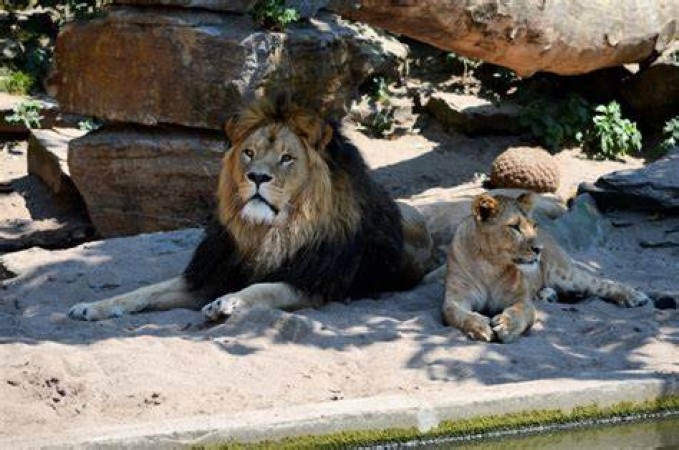
In the diverse and fascinating world of the animal kingdom, a variety of relationship dynamics can be observed. One intriguing phenomenon is the concept of lifelong partnerships among certain species. These partnerships involve monogamous behavior, where individuals commit to a single partner for an extended period or even for life. This article delves into the captivating realm of monogamy in the animal kingdom, shedding light on the reasons behind this behavior, the species that exhibit it, and the significance it holds in the grand tapestry of nature.
Monogamy in the animal kingdom refers to the practice of forming long-term partnerships between individuals of the same species. These partnerships involve shared responsibilities such as nesting, raising offspring, and foraging for food. Unlike polygamous species where individuals have multiple partners, monogamous animals commit exclusively to one mate.
Monogamous behavior has evolutionary implications. It often arises in species where the survival and well-being of offspring require the joint efforts of both parents. By forming a strong partnership, these animals increase the likelihood of their offspring's survival and success in a competitive environment.
Penguins are a prime example of monogamy in the animal kingdom. Species like the Emperor penguin are known for their unwavering commitment to their partners. During harsh Antarctic winters, male and female Emperor penguins take turns incubating the eggs and providing warmth.
Wolves are not only skilled predators but also partners in every sense. A wolf pack often consists of an alpha pair - a dominant male and female - that leads the pack together. These mates work collaboratively to hunt, raise pups, and maintain order within the pack.
Swans are revered for their grace and elegance, and they also exhibit devotion in their partnerships. Many swan species form monogamous bonds that last for years. These majestic birds engage in synchronized swimming and elaborate courtship rituals, reinforcing their emotional connection.
Monogamous species tend to invest significant effort into parental care. Both parents contribute to tasks such as feeding, protecting, and teaching their young. This shared responsibility enhances the survival chances of the offspring.
Monogamous partnerships often involve the sharing of resources and the division of labor. By collaborating in activities like finding food and building nests, these animals optimize their chances of survival and reproductive success.
Biological mechanisms underlie monogamous behavior. Hormones like oxytocin and vasopressin play crucial roles in forming and maintaining strong bonds between partners. These chemicals are associated with trust, affection, and attachment.
Genetic factors can also influence an animal's predisposition to monogamy. Some studies suggest that variations in genes related to neural pathways and reward systems could impact an individual's likelihood of forming lasting bonds.
While monogamy offers advantages, it also comes with challenges. Environmental changes, habitat loss, and food scarcity can strain the bonds between partners. Adaptation to these challenges is essential for the survival of monogamous species.
Infidelity can occur in monogamous species, often driven by the need to ensure genetic diversity. Some animals engage in extra-pair copulations, which can introduce genetic variation while maintaining the social benefits of their primary partnerships.
In human societies, monogamy is often influenced by societal norms and cultural beliefs. While some cultures embrace lifelong partnerships, others practice different forms of relationship dynamics.
Psychologically, humans share some similarities with monogamous animals. The sense of security and emotional support derived from a committed partnership aligns with the behaviors seen in various monogamous species.
Scientists continue to debate the evolutionary reasons behind monogamous behavior. Some theories suggest that it enhances parental care and increases offspring survival, while others emphasize the advantages of resource sharing and cooperative breeding.
Environmental factors, such as habitat stability and food availability, can influence the evolution of monogamy. In certain habitats, where resources are distributed unevenly, forming a strong partnership might be advantageous.
As we explore the world of monogamous animals, we uncover the profound beauty of lifelong partnerships. These partnerships exemplify commitment, cooperation, and shared responsibilities. Humans can draw inspiration from these creatures as we navigate our own relationships and partnerships.
Monogamy in the animal kingdom is a captivating phenomenon that reflects the intricate balance between survival, reproduction, and cooperation. From penguins to wolves to swans, diverse species embrace lifelong partnerships for their unique advantages. By studying monogamous behavior, we gain insights into the complex interplay of biology, environment, and evolution.
Viral Video: Grandfather's Daring Bike Stunts Turn Him into a 'Stormy Youth
Bangalore to Experience Zero Shadow Day: What You Need to Know
Celebrating Ihana Dhillon: A Star's 28th Birthday with a Noble Cause